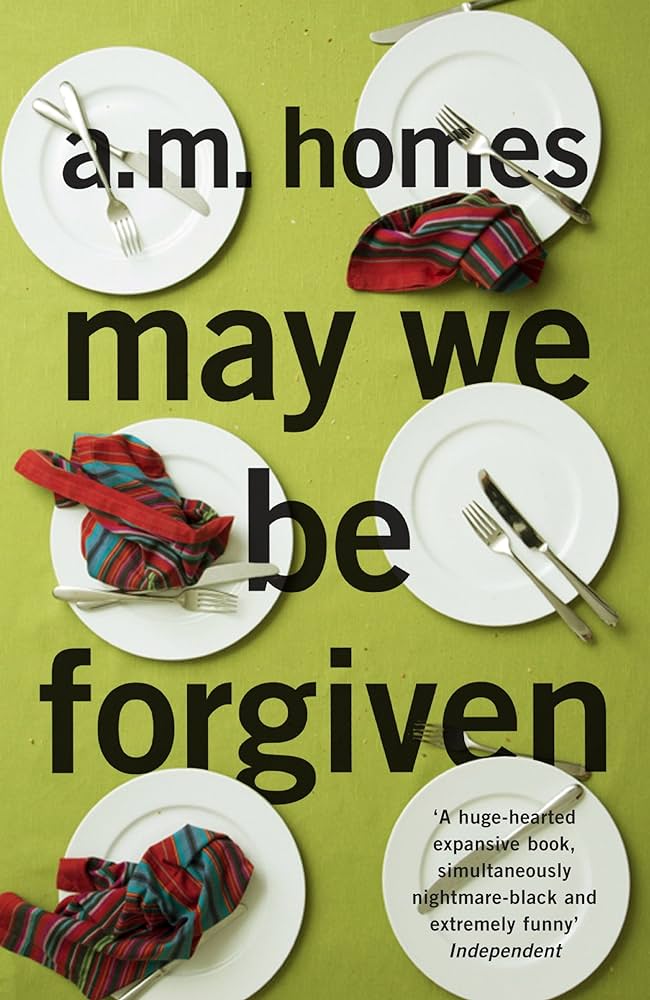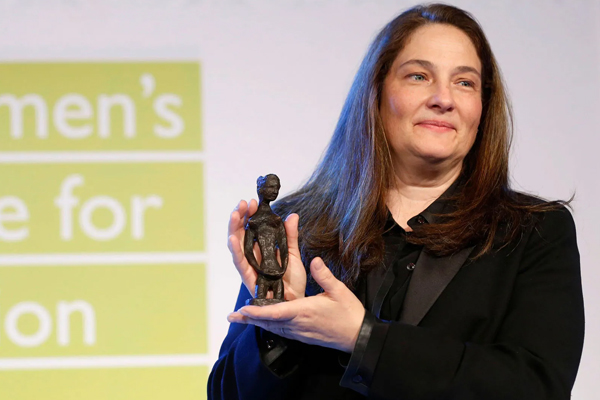From the Women’s Prize Archives.
We caught up with the inimitable A. M. Homes to discuss her initial inspiration for May We Be Forgiven, writing from the male perspective and where she keeps her Bessie…
Where did the initial idea for May We Be Forgiven come from?
Zadie Smith was working on the anthology — The Book Of Other People and asked for a short story about “strong characters.” I’d been thinking about the relationships between siblings, brothers in particular and started writing what I thought was a short story. Seven years later I finished it. Sometimes I still call it a short story, a 700 page short story—because it has the compression of a short story—something I’d never thought was possible to sustain over so many pages.
Where do you keep your Bessie (the Baileys Women’s Prize for Fiction statue presented to winners)?
I keep my Bessie close to my heart — it means an enormous amount to me, and when I have to put it down — it rests on a shelf in my office along with a photo of my brother and me when we were young children.
Your creative output is huge (journalism, short stories, writing for television, art criticism) – which do you get the most enjoyment from currently?
I’m very flattered that you think it’s huge, I perpetually think I’m behind on everything. I enjoy certain aspects of journalism and working in television — the collaboration, the chance to get input and talk with others but in the end – my heart lives in a world of the imagination — fiction.
Your work seems to be quite scathing about Western mainstream culture – do you think there’s anything redeeming about contemporary life?
There’s an enormous amount about contemporary life that’s wonderfully redeeming — social progress towards a more equitable existence for people around the world, our global connectivity allows is to exchange ideas and take action more quickly and effectively. I’m thrilled by progress in science and technology — robotics, medicine. I tell my students that their future will not be based on what they know but we can imagine… And yet, of course — all that also has a dark side, so we need to be good global citizens — aware of not just what is good for us as individuals but best for everyone. All that to say, I’m not cynical — just realistic.

You’ve written from a male perspective many times in your books (May We Be Forgiven included) – do you find this a difficult thing to do?
Oddly, I find it easier to write from a male perspective than to write from a woman’s. In fiction I am writing what my wonderful teacher, Grace Paley used to call the “Truth According To The Character.” Writing from a woman’s perspective I run a higher risk of my own experience, my own gender getting in the way. Every time I write fiction, I learn by inhabiting the experience of someone I will never be. It’s a topic of debate among my students — whether one can understand, or own an experience they’ve not lived—I firmly believe it can be done.
Forgiveness and redemption are key themes in the novel – why were these important for you to write about?
They remain important ideas to me on both a personal and a larger cultural level and are essential in terms of making peace and coming together as a global culture—history shows us time and again that nothing good is gained by holding a grudge.
Can you tell us what you’re working on now?
A book of short stories, a novel, some television projects and raising money to help Yaddo, the 100 year old artists colony in Saratoga Springs, restore its buildings so that it can continue invite artists/writers from around the world to come and do their work in a beautiful setting among a community of other artists.
I put the website there in case anyone reading this wants to apply for a residency!








